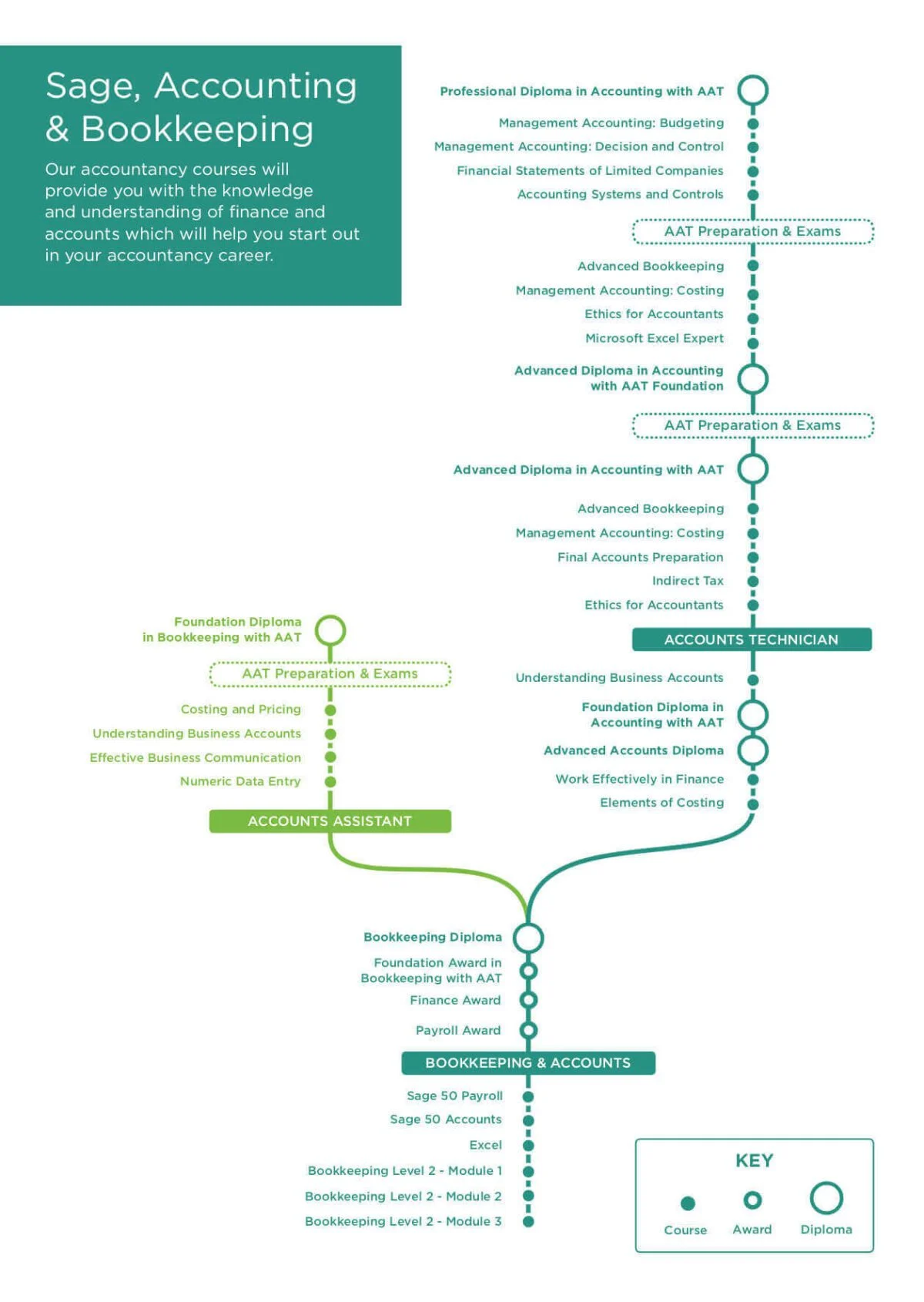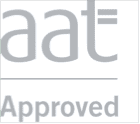What does an Accountant do?
Accountants have a very important role in all organisations. They examine and manage financial business records.
A career as an Accountant can offer a very secure career, as organisations and businesses, whatever their sector, need to manage and maintain accurate financial records.
Tasks as an Accountant can vary depending on your business, the size of it and their needs. They can include:
- Processing employee expenses
- Raising and sending out invoices
- Managing sales and purchase ledger
- Monitoring budgets
- Maintaining financial records and spreadsheets
- Preparing statutory accounts
- Preparing VAT returns
- Understanding the banking system
- Managing cash books and petty cash
- Calculating product/service costs and budget effectively
- Reconciling a supplier’s statement and payment records
- Creating customer and supplier records
- Managing ledgers
- Entering sales and purchase transactions
- Understanding banking receipts and payments
- Working effectively within or manage an accounting team
- Completing payroll functions
- Preparing final accounts
Our qualifications can open doors to a variety of roles including Accounts Assistant, Bookkeeper, Finance Assistant, Accountant and Finance Consultant roles.
What skills should you have to be an Accountant?
- Solid numerical understanding and knowledge
- Good attention to detail
- Methodical
- Able to work to strict deadlines
- Problem-solving abilities
- Able to multi-task and prioritise work
- Honest, trustworthy, reliable, discrete
- Strong IT knowledge
- Experience in using accountancy software packages

How long does it take to become an Accountant?
Each course, award and diploma varies in length and depending on how many hours you can dedicate to your study each week. Qualifications usually take between 6-18 months to complete.
Foundation Certificate or Diploma – 6-12 months – Skills required for Finance Officer roles
Gain junior and entry-level accounting roles with a foundation certificate or diploma. These courses can provide you with a solid foundation in finance administration and will cover areas such as double-entry bookkeeping to basic costing principles and using accounting software.
This is a great financial qualification to start with.
Advanced Diploma – 6-12 months – Perfect for Accounting Team Supervisors
This qualification progresses basic knowledge offering more complex accounting disciplines including financial processes, advanced bookkeeping, final accounts and ethical practices for accountants.
Professional Diploma – 9-18 months – Required for Senior and Management finance roles
You can expect to have an understanding of higher-level accounting tasks which will include drafting financial statements, managing budgets, evaluating financial performance and much more. Plus, you will have optional specialist units including business tax, personal tax, external auditing, credit, treasury and cash management.
How much do Accountants earn in the Ireland?
According to a recent survey by AAT, average salaries start from £36,000 – £69,000 for Accounts/Finance Assistants and Administrators.
This increases for Accounts/Finance Officers to around £25,464 and Team Leaders/Supervisors are on an average of £27,000.
Junior Managers can expect to earn around £28,560, Middle Managers £34,000 and Director/Senior Managers £43,000.
Geographically, Accountants in London get paid more than their North East and Welsh peers and bigger organisations may pay up to 15% more than those that are smaller and have fewer employees.
A third of employees also receive a bonus of 3-5% of their annual salary.
How much you get paid and your bonus increase with experience.
You can read the survey in full here >>
Accountancy Alumni Testimonials
Here are some of our students who have previously undertaken the Foundation Diploma in Accounting with AAT (Level 2):
- Lorraine wins a finance role after a successful career change
- Damien takes the first step to a new career
- Viv completes her Accounting Technician training and has already started her own business
What qualifications do you need to become an Accountant or progress into an Accountancy based role?
1. Pitman Course: Foundation Diploma in Accounting with AAT (Level 2)
Once you’ve completed your course you will be ideally positioned to go on and undertake the AAT Foundation Certificate in Accounting qualification (Level 2).
The Foundation Diploma in Accounting can lead to careers such as:
- Accounts Assistant
- Purchase Ledger Clerk
- Accounts Administrator
- Sales Ledger Clerk
- Accounts Payable Clerk
- Trainee Finance Assistant
2. Pitman Course: Advanced Diploma in Accounting with AAT (Level 3)
Once you’ve completed your course you will be ideally positioned to go on and undertake the AAT Advanced Diploma in Accounting qualification (Level 3).
The Advanced Diploma in Accounting can lead to careers such as:
- Tax Accountant
- Credit Controller
- Assistant Accountant
- Payroll Administrator
- Tax Assistant
- Audit Trainee
- Accounts Payable Clerk
3. Pitman Course: Professional Diploma in Accounting with AAT (Level 4)
Once you’ve completed your course you will be ideally positioned to go on and undertake the AAT Professional Diploma in Accounting qualification (Level 4).
The Professional Diploma in Accounting can lead to careers such as:
- Accountant
- Financial Controller
- Payroll Manager
- Commercial Analyst
- Billing Manager
- Assistant Financial Accountant
- Accounts Payable Supervisor

What is an AAT qualification and what is it equivalent to?
A Foundation Certificate or Diploma is the equivalent to:
- Level 2 (Level 5 Scotland)
- GCSE (grades A*-C)
- Key Stage 5 Technical Certificate
A Foundation Certificate or Diploma is the equivalent to:
- Level 3 (Level 6)
- A Level/AS Level (grades A-E)
- Key Stage 5 Technical Certificate
A Professional Diploma is the equivalent to
- Level 4 (Level 8 Scotland)
- Foundation degree
- Higher apprenticeship (Technical – Scotland)
- High education diploma
- HND and HNC
- NVQ 4/5
Does AAT make you a qualified Accountant?
You can become a professional AAT Accountant (MAAT) once you have completed the following:
- Pitman Training’s Foundation Diploma in Accounting & the AAT Foundation Certificate in Accounting qualification.
- Pitman Training’s Advanced Diploma in Accounting & the AAT Advanced Diploma in Accounting qualification.
- Pitman Training’s Professional Diploma in Accounting & the AAT Professional Diploma in Accounting qualification.
- Work experience requirements.
- Application for AAT full membership.
Find out more about achieving professional MAAT status on AAT’s website.


















